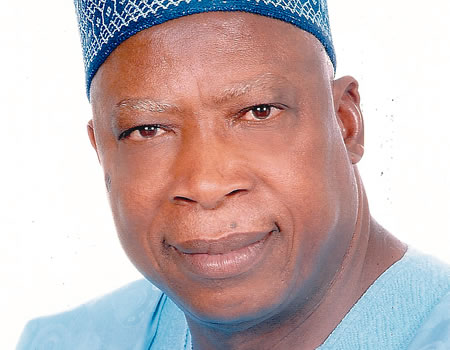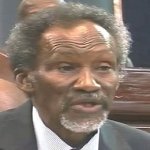Senator Abdullahi Adamu, a two-term governor of Nasarawa State and senator representing Nasarawa West Senatorial District, speaks with AYODELE ADESANMI on the calls for the restructuring of Nigeria and other issues.
Some persons have attributed the current economic recession to the policies of the present administration, do you agree with this?
The mere statement that the new administration made about its intention to fight corruption and go after corrupt people in a bid to stamp out the vice from our socio-political life cannot be linked to recession. It was absolutely clear when the administration came in that there had been mismanagement of our resources, especially government funds. This is not hidden. Everybody witnessed how money was spent and taken from government treasury without budgetary provisions, especially in the name of promoting government activities.
However the issue of recession is essentially due to the prices of oil going down to as low as below $30 when this government came into office and this is critical. It is also largely due to global economic recession, which also affected our country. Hopefully, by the end of this quarter, the country would be out of its present predicament.
There have been several propositions on the need to diversify the country’s economy. As the chairman of the Senate Committee on Agriculture, how do you think the diversification would help the country out of recession?
One big point we keep missing anytime we are confronted with this type of question is that the parliament or the National Assembly is responsible for initiating programmes that would boost agriculture and improve the economy. This is not correct. The legislature is to make laws, which can be through private member bills or executive bills, which can direct the executive to do certain things. Another function of the National Assembly is the approval of the budgets and seeing to the performance of such through the oversight functions. This is to ascertain that funds allocated to projects are actually spent on them and judiciously too. The executive comes to us with a proposal and it is the duty of the legislature to look at it and see to it and approve or reject completely. However, we need to look into such proposal how it would help the country.
Advocates of restructuring have, in recent times, increased their call for the restructuring of the country. Do you agree with the agitators?
I am not against restructuring per se, but l am against empty talks. You are talking about restructuring Nigeria, agreed. But what do you want to restructure? What is not working that you want to restructure? You need to be specific. After that, we can see to it and look into what you are proposing, but you cannot just throw an empty shell and say restructuring just to score a cheap political point.
Maybe there are some things somewhere that are of concern to some people and you find yourself in certain positions to cheaply get into their minds and gain political identification and support by
just talking restructuring. Such ways do not make sense. You just need to be specific. We are a federation, if you think the federal system as we have it today in terms of geopolitical zones, in terms of governance at federal or states or the council areas, tell us you have issues with any of these and make specific suggestions. Be specific about what is wrong with what we have today; put your proposal on the
table so that we can talk. If you are talking of restructuring of the 36 states, we will know what you are talking about; be specific. Anybody can just go to the marketplace and talk about restructuring Nigeria, such does not mean anything. The fact of the matter is that we have cheapened the issue of our independence. Some of the states we have at present are not economically viable because at this point in time, the diversification of economic activities that can improve the economy of the country is not exploited fully. As a result of that, they don’t have the kind of money to provide the roads and other infrastructure.
While growing up, I witnessed the growth of the First Republic; I was already working before the First Republic ended. And from what l saw and read and what l discussed with people, there was a healthy competition among the regions. First, it was protectorates, Southern and Northern, and later there was the Northern, Eastern and Western regions and by 1963, the Mid-western region came up. There was competition but they were developing at their own pace and got a share from the central government treasury. The resources were in the central pool. The resources then were shared according to some formula. Regions then were developing their own budgets to suit their own purposes and it worked. There was healthy rivalry. Today, the competition we have was not like the one we had when we were operating the regions. However, we missed it at a point that the military came into our polity. Military intervention killed both political and economic growths in the country. The military has so much discredited the politicians; essentially, they were not patient enough. Besides they had so much dismembered the political groups. The military toppled the civilians because of alleged corruption but one found out that they were more corrupt than the civilians.
Some persons have advocated the sale of national assets as a way out of recession but the Senate voted against the Idea. What is your view on this?
I think it would have been a great disservice to this country if we sold our national assets. It would mean that we have not learnt from history and history would not forgive us. This is not the first time that the national assets were sold. A good example is the Ajaokuta Steel Complex, which had problems and some people believed that the solution was to sell it. After selling, what happened? The buyers later removed some parts of the machines and took them to their own countries and made
use of them. Also, the Mercedes Company in Enugu, Steyr in Gombe, Fiat Truck Manufacturing in Kano, Volkswagen in Lagos were all sold and you will agree with me that nothing happened afterwards. Now, because of recession you want to sell some of our best companies. Where does that take us and what guarantee do you have? The reason behind the proposal to sell the assets is to get immediate money; but if you sell, everybody knows the status of our naira presently against the dollar.
During the debate at the Senate plenary, l made my point very clear. Selling would create more disparity between the citizens and those who have got money. There is not going to be an easy way out; hard times require hard decisions. I believe this government is serious. Let the country borrow money, this country is credit-worthy. One other way out is to renegotiate the debt; that is so to say bring it down. It does not make sense to sell what you have to get what you don’t have.
The issue of Fulani herdsmen has generated a lot of controversy in recent times. What do you think is the way out?
I think from the word go, when you say Fulani; there is already an element of prejudice, because l don’t believe that every herdsman in the country is a Fulani man. It is a fact that a Fulani man lives a nomadic
life; like grazing, among others, but I want to say categorically that l know people who are not Fulani and are into cattle-rearing. If you go to Igboland, they rear cattle, Yoruba in the South-West rear cattle. I don’t want people to attach violence to herdsmen and grazing. I think people have gone the extra mile to over-politicise the issue of grazing. This issue of herdsmen came into public glare immediately after the 2015 election in order to discredit the Federal Government. It was a campaign of hate to say that President Buhari is not competent. But was he not the one who gave the security agents the directive to pursue anybody anywhere who was involved in violence in the name of grazing? I don’t support anybody who carries illegal arms, be you Hausa, Igbo or Yoruba. Let us say the reality, inter-communal clashes are not peculiar to the Fulani alone. I was a governor; clashes took place in my state and other states. The inter-ethnic clashes should not be restricted to herdsmen.
WATCH TOP VIDEOS FROM NIGERIAN TRIBUNE TV
- Let’s Talk About SELF-AWARENESS
- Is Your Confidence Mistaken for Pride? Let’s talk about it
- Is Etiquette About Perfection…Or Just Not Being Rude?
- Top Psychologist Reveal 3 Signs You’re Struggling With Imposter Syndrome
- Do You Pick Up Work-Related Calls at Midnight or Never? Let’s Talk About Boundaries







